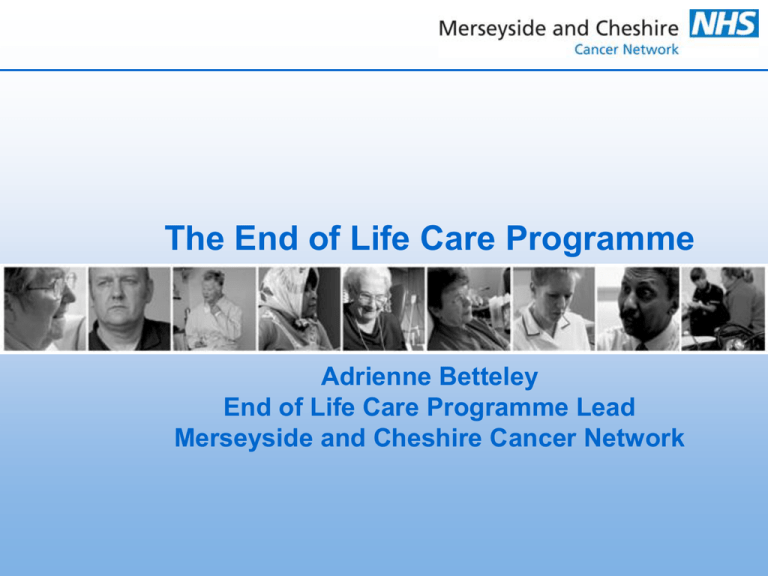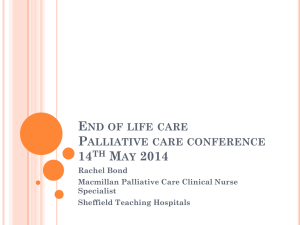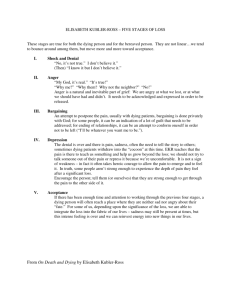End of Life Care Strategy - Cheshire & Merseyside Strategic Clinical
advertisement

The End of Life Care Programme Adrienne Betteley End of Life Care Programme Lead Merseyside and Cheshire Cancer Network Most people would prefer to die at home The majority die in an acute setting…. It helps to have some foundations to build upon! End of Life Care Strategy Context • First ever national strategy on end of life care • Developed in parallel with the Next Stage Review End of Life Care Strategy The Strategy • covers all conditions • covers all care settings (eg home, hospital, hospice, care home, community hospital, prison etc) • has been developed within the current legal framework End of Life Care Strategy Aims: • To bring about a step change in quality of care for people approaching the end of life • To enhance choice at the end of life • To deliver the Government’s manifesto commitment to double investment in palliative care Chapter 1 Chapter 8 The challenges of end of life care Making change happen Chapter 7 Measurement and research Death, dying and society End of Life Care Strategy Chapter 6 Workforce Chapter 2 Chapter 3 The end of life care pathway Chapter 4 Chapter 5 Support for carers and families Care in different settings The End of Life Care Pathway Step 1 Step 2 Discussions as the end of life approaches Assessment, care planning and review • Open, honest communication • Identifying triggers for discussion • Agreed care plan and regular review of needs and preferences • Assessing needs of carers Step 3 Coordination of care • Strategic coordination • Coordination of individual patient care • Rapid response services Step 4 Delivery of high quality services in different settings • High quality care provision in all settings • Acute hospitals, community, care homes, hospices, community hospitals, extra care housing prisons, secure hospitals and hostels • Ambulance services Spiritual care services Support for carers and families Information for patients and carers Step 5 Care in the last days of life • Identification of the dying phase • Review of needs and preferences for place of death • Support for both patient and carer • Recognition of wishes regarding resuscitation and organ donation Step 6 Care after death • Recognition that end of life care does not stop at the point of death. • Timely verification and certification of death or referral to coroner • Care and support of carer and family, including emotional and practical bereavement support Summary • The strategy sets out a vision to transform end of life care in this country over the coming years • Action is now be taken by a very large number of people and organisations who contribute to commissioning, delivery of care, education and research The Political Map ! Review – Life Cycle (8 groups) End of Life Care Strategy End of Life Clinical Working Group Framework ? Extended to other 9 SHA’s US ! Healthier Horizons for the North West 11 recommendations MCCN Programme 2009-2012 • Programme devolved to the Cancer Network • In line with the 11 recommendations from Healthier Horizons http://www.northwest.nhs.uk/healthierhorizons/ Key issues – End of Life • Establishing advance care planning systematically • Enabling patients who wish to die at home to do so • Establishing a supportive palliative care register across settings • Development of joint commissioning/funding • Establishing integrated information systems • Equity of access for bereaved relatives for support Patient Pathway Review Identify needs Assess need Implement Plan 1 year + Advancing disease 1 year + Increasing Morbidity Last Days of Life GSF/PPC LCP Preferred Priorities for Care (PPC) Gold Standards Framework (GSF) Liverpool Care Pathway (LCP) First Days of Death Bereavement NHS - End of Life Tools End of Life Care Strategy 1 2 3 Preferred Priorities for Care www.endoflifecare.nhs.uk www.endoflifecareforadults.nhs.uk Advance Care Planning Advance care planning Statement of wishes and preferences Advance decisions Lasting power of attorney Process • • the process is voluntary the content of any discussion should be determined by the individual concerned Competency framework Advance decisions/stat ement of wishes Facilitate ACP discussions/statement of wishes Preferred Priorities for Care (formerly known as Preferred Place of Care) (PPC) What is it? • An advance care plan for people with a life limiting illness who wish to have their choices and preferences recorded in relation to their care and ultimate place of death • A patient held record which should go with the patient if they are transferred to a different care setting Background to the PPC • Originated in Lancashire & South Cumbria Cancer Services Network 2003 • Recommended by Department of Health End of Life Care Programme • Used in variety of settings for patients with lifelimiting conditions Positives of Implementing • • • • • • Empowering for patients Opens up vital discussions Promotes choice Excellent way of lobbying for further resources Helps prevent inappropriate transfer to another setting. Builds staff confidence and encourages difficult conversations The new PPC document • Change from Preferred Place of Care to Preferred Priorities for Care • Patient-held advance care plan • Only to be used for those who have mental capacity • Allows patients to consider, discuss and document their preferences and priorities for care as they approach the end of life Support • Not everyone finds it easy to have conversations about death and dying • Staff may need additional support through communication skills training or through mentor or peer support – may be a Specialist Palliative Care Nurse Gold Standards framework http://www.goldstandardsframework.nhs.uk Aim of GSF • Aim is to develop a practice-based system to improve the organisation and quality of care of patients in the last year of life in the community Gold Standards Framework • Better organisation of care for some of the most needy patients • Better teamwork and practice morale • Fewer crisis calls and admissions with more proactive care • Better quality of care for patients in the last year of life at home • More patients enabled to die well in their place of choice The Key Tasks or 7 Cs • • • • • • • Communication Co-ordination Control of symptoms Continuity out of hours Continued learning Carer support Care of the dying GSF is About • Planning ahead • Anticipatory care helps avoid crisis and can enable: – Improved support for families and nursing teams – Reduction in hospital admissions – Achievement of preferred place of care Liverpool Care Pathway Care of the Dying Audit • NATIONAL AUDIT SHOWS DYING PATIENTS RECEIVE HIGH QUALITY CARE SUPPORTED BY THE LIVERPOOL CARE PATHWAY FOR THE DYING PATIENT (LCP). The second National Care of the Dying Audit of Hospitals (NCDAH) published 14th September 2009, shows that patients on the Liverpool Care Pathway for the Dying Patient (LCP) are receiving high quality care in the last hours and days of life. The audit covers the use of the LCP in 155 hospitals, looking at the records of almost 4000 patients. New Version • Version 12 LCP will be launched at the LCP Conference 25th November 2009 at the Royal Society of Medicine - London. www.lcp-mariecurie.org.uk How we measure the uptake of the EOLC tools in MCCN • • • • Data collection tools used across sectors Level Descriptors Death data (ONS) Quality Markers Example of data collection tool Level Descriptors Level 0 The organisation has not implemented the specific EOLC tool Level 1 The organisation has plans in place for the implementation of the specific EOLC tool Level 2 The organisation is in the early phase of implementation of the specific EOLC tool Level 3 The organisation is able to demonstrate implementation of the specific EOLC tool Level 4 The organisation has embedded and sustained the specific EOLC tool. MCCN Targets Quality Markers as a way of measuring for the future Dying Matters “to support changing knowledge, attitudes and behaviours towards death dying and bereavement, and through this to make ‘living and dying well’ the norm”. MCCN – Dying Matters Campaign Promoting healthier attitudes to the end-of-life makes sense Contact details 0151 201 4150 Adrienne.Betteley@mccn.nhs.uk







